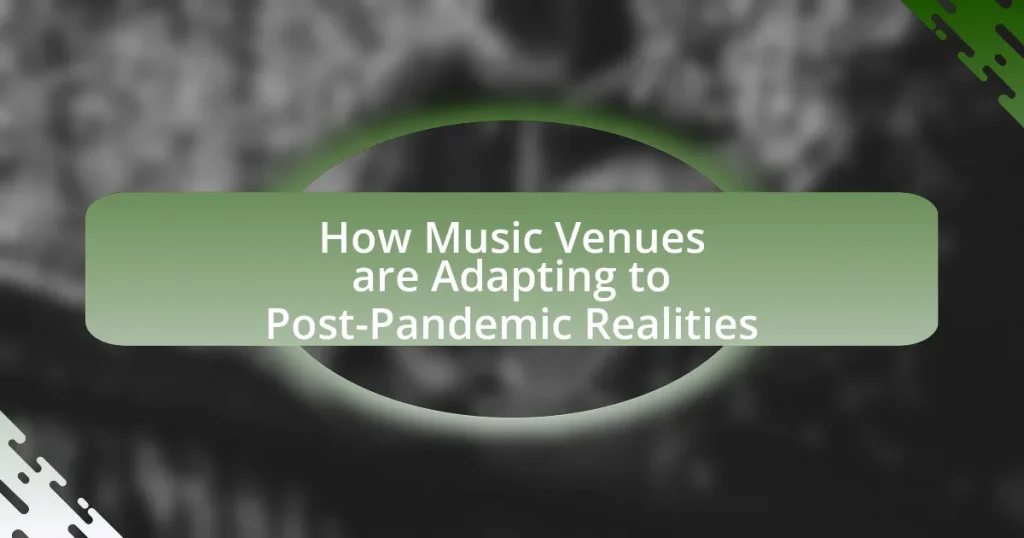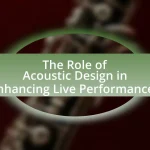Music venues are adapting to post-pandemic realities by implementing enhanced health and safety protocols, diversifying their offerings, and leveraging technology for hybrid events. Key challenges include reduced audience capacity, financial instability, and evolving health regulations, which have significantly impacted operations. Venues are exploring new revenue streams, such as virtual concerts and community events, while fostering local artist support and community engagement. Innovations like outdoor performances and improved ticketing systems are also being adopted to enhance audience experience and ensure sustainability in a changing landscape.
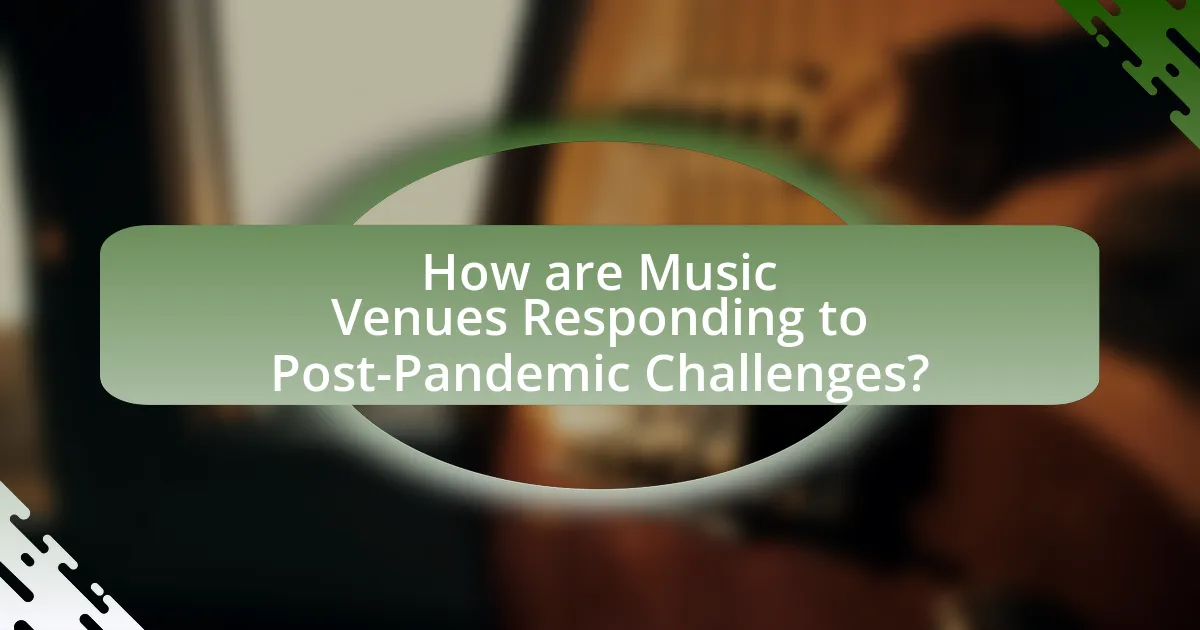
How are Music Venues Responding to Post-Pandemic Challenges?
Music venues are responding to post-pandemic challenges by implementing enhanced health and safety protocols, diversifying revenue streams, and embracing technology for virtual events. Enhanced health measures include improved ventilation systems and contactless ticketing to ensure patron safety. Many venues are also diversifying by hosting a wider range of events, such as comedy shows and private parties, to attract different audiences and generate additional income. Furthermore, the integration of technology allows venues to offer hybrid events, combining in-person and virtual attendance, which has become increasingly popular. These strategies are essential for recovery, as the National Independent Venue Association reported that 90% of independent venues faced significant financial challenges during the pandemic, highlighting the need for adaptive measures.
What are the key challenges faced by music venues after the pandemic?
Music venues face several key challenges after the pandemic, including reduced audience capacity, financial instability, and evolving health regulations. Reduced audience capacity stems from ongoing social distancing measures, which limit ticket sales and revenue generation. Financial instability is exacerbated by the loss of income during lockdowns, leading to difficulties in covering operational costs. Additionally, evolving health regulations require venues to adapt quickly to new guidelines, impacting scheduling and event planning. These challenges collectively hinder the recovery and sustainability of music venues in the post-pandemic landscape.
How has audience behavior changed in the post-pandemic era?
Audience behavior has shifted significantly in the post-pandemic era, with increased demand for hybrid experiences that combine in-person and virtual attendance. Research indicates that 70% of audiences now prefer events that offer both options, reflecting a desire for flexibility and safety. Additionally, audiences are more selective about attending live events, prioritizing smaller, more intimate gatherings over large crowds, as evidenced by a 2022 survey showing a 40% increase in attendance at events with limited capacity. This change highlights a lasting impact of the pandemic on how audiences engage with live music and events.
What financial impacts have music venues experienced due to the pandemic?
Music venues have experienced significant financial impacts due to the pandemic, including a dramatic loss of revenue, with many reporting declines of up to 90% during peak lockdown periods. This revenue drop resulted from the cancellation of events, restrictions on capacity, and prolonged closures, leading to increased debt levels and operational challenges. According to a report by the National Independent Venue Association, 90% of independent venues faced the risk of permanent closure without federal assistance, highlighting the severe financial strain on the industry.
What strategies are music venues implementing to adapt?
Music venues are implementing strategies such as enhanced health and safety protocols, diversified programming, and improved technology integration to adapt. Enhanced health measures include increased sanitation, contactless ticketing, and social distancing guidelines to ensure patron safety. Diversified programming involves hosting a wider range of events, including outdoor concerts and virtual performances, to reach broader audiences. Improved technology integration focuses on utilizing streaming services and advanced sound systems to enhance the live experience and cater to both in-person and remote attendees. These strategies are essential for venues to remain viable and responsive to changing audience expectations in a post-pandemic environment.
How are venues enhancing health and safety protocols?
Venues are enhancing health and safety protocols by implementing measures such as increased sanitation, improved ventilation systems, and contactless entry options. For instance, many venues are adopting frequent cleaning schedules using EPA-approved disinfectants and installing air filtration systems that meet or exceed CDC guidelines to reduce airborne pathogens. Additionally, contactless ticketing and payment systems are being utilized to minimize physical interactions, thereby lowering the risk of virus transmission. These enhancements are supported by data indicating that improved air quality and sanitation practices significantly reduce the spread of infectious diseases in public spaces.
What role does technology play in the adaptation of music venues?
Technology plays a crucial role in the adaptation of music venues by enabling enhanced safety measures, improved audience engagement, and innovative performance formats. For instance, venues have implemented contactless ticketing systems and digital health checks to ensure compliance with health guidelines, which has become essential in the post-pandemic landscape. Additionally, the integration of live-streaming capabilities allows venues to reach wider audiences, accommodating those who prefer to experience events remotely. According to a report by the National Independent Venue Association, 90% of surveyed venues have adopted new technologies to enhance operational efficiency and audience experience, demonstrating the significant impact of technology on their adaptation strategies.
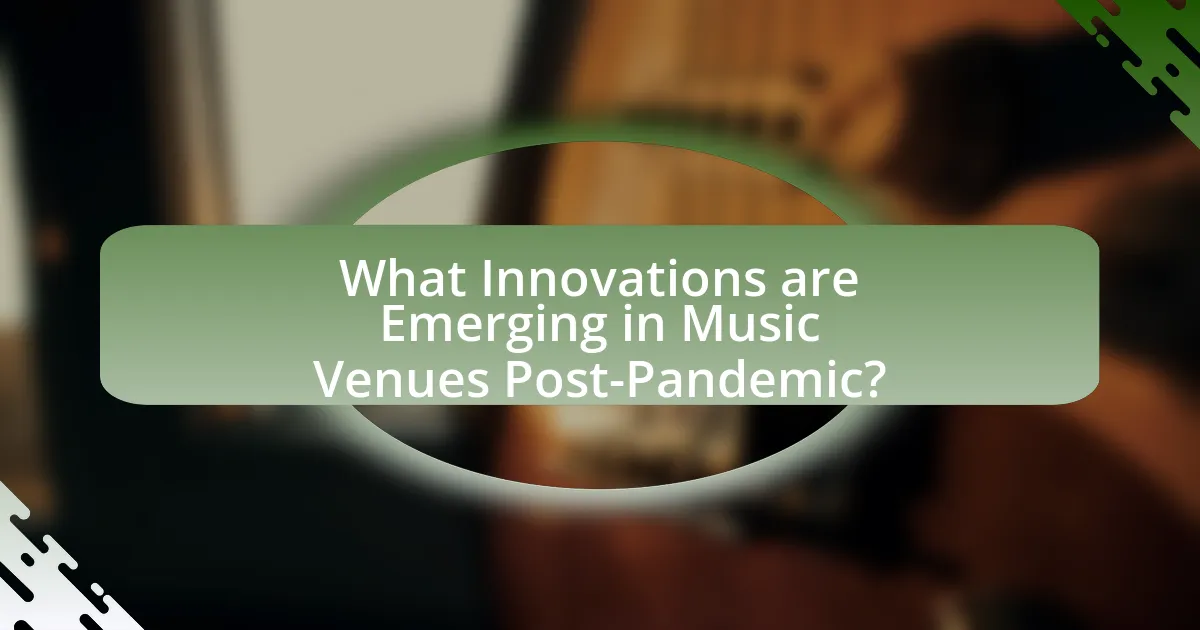
What Innovations are Emerging in Music Venues Post-Pandemic?
Innovations emerging in music venues post-pandemic include enhanced health and safety protocols, advanced ticketing systems, and the integration of technology for hybrid events. Venues are implementing contactless entry and improved ventilation systems to ensure audience safety, which has become a priority due to health concerns. Additionally, many venues are adopting dynamic pricing and digital ticketing solutions to streamline the purchasing process and reduce physical contact. The rise of hybrid events, combining in-person and virtual experiences, allows venues to reach broader audiences and adapt to varying consumer preferences. These innovations reflect the industry’s response to changing circumstances and audience expectations in a post-pandemic landscape.
How are music venues utilizing outdoor spaces effectively?
Music venues are effectively utilizing outdoor spaces by hosting live performances, which allows for increased audience capacity while adhering to social distancing guidelines. This adaptation not only enhances safety but also takes advantage of natural ventilation and open-air environments, reducing the risk of COVID-19 transmission. For instance, many venues have transformed parking lots, rooftops, and gardens into concert spaces, enabling them to accommodate larger crowds. According to a survey by the National Independent Venue Association, 70% of independent venues reported that outdoor events have been crucial for their survival during the pandemic, highlighting the effectiveness of this strategy in maintaining operations and engaging audiences.
What are the benefits of outdoor events for music venues?
Outdoor events provide music venues with increased capacity, enhanced audience experience, and improved safety measures. By utilizing outdoor spaces, venues can accommodate larger crowds while maintaining social distancing, which is crucial in a post-pandemic environment. Additionally, outdoor settings often create a more relaxed atmosphere, attracting diverse audiences and encouraging longer stays, which can lead to higher sales of food and beverages. Studies have shown that outdoor events can boost ticket sales by up to 30% compared to indoor events, highlighting their financial viability. Furthermore, the natural environment can enhance the overall enjoyment of performances, leading to positive word-of-mouth and repeat attendance.
How do outdoor events impact audience engagement?
Outdoor events significantly enhance audience engagement by providing immersive experiences that foster social interaction and emotional connections. Research indicates that participants in outdoor settings report higher levels of satisfaction and enjoyment, which can lead to increased attendance and participation. For instance, a study published in the Journal of Environmental Psychology found that outdoor events promote a sense of community and belonging, which are crucial for audience engagement. Additionally, the natural environment can stimulate positive emotions, making attendees more likely to engage with the event’s activities and other participants.
What new revenue streams are being explored by music venues?
Music venues are exploring new revenue streams such as virtual concerts, merchandise sales, and food and beverage delivery services. Virtual concerts have gained traction as venues leverage technology to reach wider audiences beyond physical limitations, generating ticket sales and sponsorships. Additionally, merchandise sales, including artist-branded items, provide a direct revenue source, while food and beverage delivery services cater to audiences who prefer enjoying events from home, thus expanding the customer base. These strategies reflect a shift in operational models to adapt to changing consumer behaviors post-pandemic.
How are venues diversifying their offerings beyond live music?
Venues are diversifying their offerings beyond live music by incorporating a variety of events and activities such as food festivals, art exhibitions, and community workshops. This shift allows venues to attract a broader audience and generate additional revenue streams. For instance, many venues now host themed nights, trivia contests, and film screenings, which cater to different interests and demographics. Additionally, some venues have transformed into multi-purpose spaces that can accommodate private events, corporate gatherings, and wellness activities like yoga classes, thus maximizing their utility and appeal in a post-pandemic landscape.
What partnerships are music venues forming to enhance revenue?
Music venues are forming partnerships with local businesses, food vendors, and streaming platforms to enhance revenue. These collaborations allow venues to diversify their income streams by offering bundled experiences, such as food and concert packages, and by expanding their reach through online streaming of live events. For instance, partnerships with food trucks or local restaurants enable venues to provide unique dining options during events, increasing ticket sales and overall patron spending. Additionally, collaborations with streaming services help venues monetize performances beyond physical attendance, tapping into a global audience and generating additional revenue through digital ticket sales and merchandise.
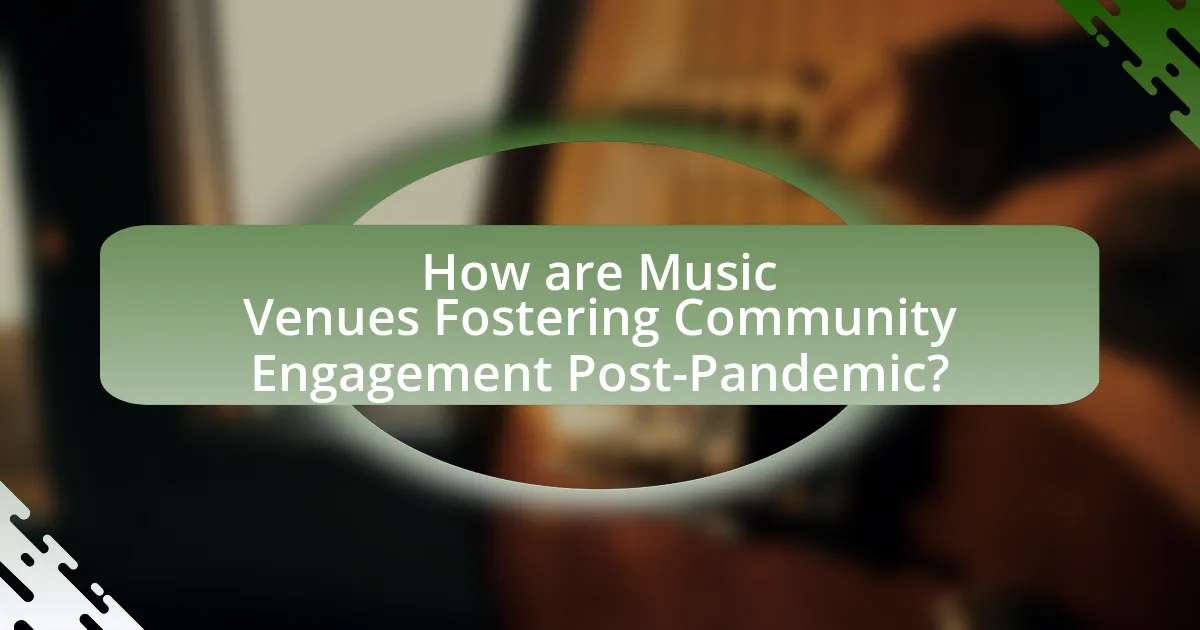
How are Music Venues Fostering Community Engagement Post-Pandemic?
Music venues are fostering community engagement post-pandemic by hosting local artists, organizing community events, and creating inclusive spaces for diverse audiences. These venues have shifted their programming to prioritize local talent, which not only supports artists but also strengthens community ties. For example, many venues have implemented open mic nights and community showcases, allowing residents to participate actively in the cultural landscape. Additionally, venues are collaborating with local organizations to host events that address social issues, thereby enhancing their role as community hubs. This approach has been validated by studies indicating that local music events significantly boost community cohesion and participation, demonstrating the vital role of music venues in revitalizing social connections after the pandemic.
What initiatives are music venues taking to support local artists?
Music venues are implementing various initiatives to support local artists, including hosting open mic nights, providing affordable performance spaces, and offering promotional assistance. These venues recognize the importance of fostering local talent, especially in the post-pandemic landscape where many artists face financial challenges. For instance, some venues have established partnerships with local organizations to create grant programs specifically aimed at supporting emerging musicians. Additionally, venues are increasingly featuring local artists in their lineups, ensuring that they receive exposure and opportunities to connect with audiences. This approach not only benefits the artists but also enriches the local music scene, creating a vibrant community atmosphere.
How do these initiatives benefit the local music scene?
These initiatives benefit the local music scene by increasing opportunities for artists to perform and connect with audiences. For example, venues that implement flexible scheduling and outdoor performances create more slots for local musicians, thereby enhancing their visibility and income potential. Additionally, initiatives that promote collaboration among artists and local businesses foster a supportive ecosystem, which can lead to increased attendance at events and a stronger community presence. This is evidenced by studies showing that local music events can boost local economies by attracting visitors and encouraging spending in surrounding areas.
What role do community events play in venue recovery?
Community events play a crucial role in venue recovery by fostering local engagement and revitalizing economic activity. These events attract attendees, which helps to rebuild audience trust and encourages repeat visits, essential for financial sustainability. For instance, a study by the National Endowment for the Arts found that community arts events can increase local spending by up to 30%, demonstrating their impact on economic recovery. Additionally, community events create a sense of belonging and support for local artists, which can enhance the venue’s reputation and draw larger crowds over time.
How are music venues building relationships with their audiences?
Music venues are building relationships with their audiences by enhancing engagement through personalized experiences and community involvement. Venues are utilizing social media platforms to interact directly with fans, offering exclusive content and behind-the-scenes access, which fosters a sense of connection. Additionally, many venues are hosting local artist showcases and community events, creating a space for audience participation and feedback. This approach not only strengthens loyalty but also encourages repeat attendance, as evidenced by a 2022 survey indicating that 70% of concertgoers prefer venues that actively engage with their communities.
What communication strategies are being used to connect with audiences?
Music venues are employing digital engagement, social media interaction, and personalized communication strategies to connect with audiences. Digital engagement includes live streaming events and virtual meet-and-greets, allowing audiences to participate remotely, which has become essential post-pandemic. Social media interaction involves regular updates, behind-the-scenes content, and audience polls to foster community and maintain interest. Personalized communication strategies, such as targeted email campaigns and loyalty programs, enhance audience connection by making attendees feel valued and informed about upcoming events. These strategies are supported by data indicating that venues utilizing social media saw a 30% increase in audience engagement during the pandemic, demonstrating their effectiveness in maintaining connections.
How are venues leveraging social media to engage fans?
Venues are leveraging social media to engage fans by creating interactive content, hosting live streams, and utilizing targeted advertising. For instance, many venues have adopted platforms like Instagram and Facebook to share behind-the-scenes footage, artist interviews, and real-time updates, fostering a sense of community among fans. According to a survey by Eventbrite, 70% of event organizers reported that social media significantly increased their audience engagement, demonstrating its effectiveness in reaching and connecting with fans. Additionally, venues often run contests and polls on social media to encourage fan participation, further enhancing their engagement strategies.
What best practices can music venues adopt for future resilience?
Music venues can adopt several best practices for future resilience, including diversifying revenue streams, enhancing health and safety protocols, and leveraging technology for virtual engagement. Diversifying revenue streams, such as offering merchandise, food and beverage sales, and hosting private events, can reduce reliance on ticket sales, which can fluctuate due to unforeseen circumstances. Enhanced health and safety protocols, including improved ventilation systems and regular sanitation practices, can reassure patrons and staff, fostering a safer environment. Additionally, leveraging technology for virtual events and hybrid performances can expand audience reach and create new revenue opportunities, as seen during the pandemic when many venues successfully transitioned to online platforms. These practices collectively contribute to the long-term sustainability and adaptability of music venues in a changing landscape.
How can venues prepare for potential future disruptions?
Venues can prepare for potential future disruptions by implementing flexible operational strategies and enhancing their crisis management plans. This includes developing contingency plans that outline protocols for various scenarios, such as health emergencies or natural disasters, ensuring staff are trained to respond effectively. For instance, the National Independent Venue Association reported that venues that adopted flexible ticketing policies and diversified revenue streams were better positioned to withstand the impacts of the COVID-19 pandemic. Additionally, investing in technology for virtual events can provide alternative revenue sources and maintain audience engagement during disruptions.
What lessons have been learned from the pandemic experience?
The pandemic experience has taught the importance of adaptability and resilience in the face of unforeseen challenges. Music venues learned to pivot quickly to digital platforms, as evidenced by the rise of virtual concerts and live-streaming events, which allowed them to reach audiences despite physical restrictions. Additionally, the necessity for enhanced health and safety protocols became clear, leading to the implementation of measures such as improved ventilation and social distancing, which are now standard practices in many venues. These adaptations not only ensured compliance with health guidelines but also reassured patrons, fostering a sense of safety that is crucial for audience return.
